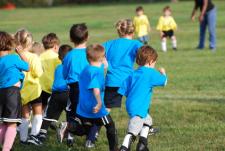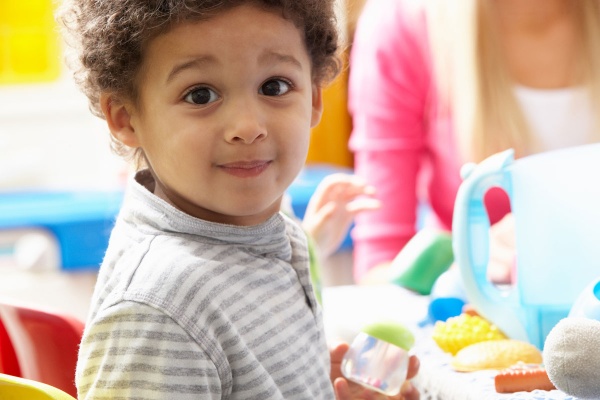
The Super Soccer Mom Game Plan
I’ve always thought myself to be a pretty mellow sports fan. I love watching sports, I just don’t love it. Going to Busch Stadium for me is really an excuse to eat hot dogs and get a tan. I think the last time I really got passionate – and by passionate, I mean jumping on a table and knocking over a round of beers – over a game was the Illinois-Arizona Elite 8 matchup in 2005.
But when it’s your own kid, you become a fanatic.
 As I sat in my lawn chair during my 4-year-old’s first soccer game, I knew I had to keep my emotions in check. While I cheered MJ and her teammates on, I eventually had to clamp my hand over my mouth to stop myself from playing sideline coach or admonishing the referee for failing to eject the dirty-playin’ preschooler who tripped my kid.
As I sat in my lawn chair during my 4-year-old’s first soccer game, I knew I had to keep my emotions in check. While I cheered MJ and her teammates on, I eventually had to clamp my hand over my mouth to stop myself from playing sideline coach or admonishing the referee for failing to eject the dirty-playin’ preschooler who tripped my kid.
To ensure I remain the supportive – not obnoxious – parent in the stands, I turned to Dr. David Shields via e-mail to get his insights on what makes a good sports parent. Shields is an expert in healthy competition – he’s an associate professor in the College of Education at the University of Missouri-St. Louis, author of True Competition: A Guide to Pursuing Excellence in Sports & Society and founder of TrueCompetition.Org, a nonprofit dedicated to providing the insights, skills and approaches necessary to reclaim competition as a place of excellence, ethics and enjoyment.
Q. How can parents best build their little athletes’ self-confidence on and off the field? Where is that happy medium between criticizing them and coddling them?
A. It is important to recognize that young children are concerned more with having fun and receiving approval than they are about any objective standards of performance. Their sense of self-confidence is largely a reflection of how much confidence they believe others have in them. Parents can build that confidence by following a two-fold strategy:
On the one hand, it is helpful to point out, without exaggeration, the things that the child is doing well. Make comments as specific as possible. It is more helpful, for example, to say "You made great contact with the ball," than to simply say, "You did a nice job out there today."
Second, and more importantly, parents should focus on the joy of the experience. "Tell me what was most fun for you today?" Please keep in mind that children grow and mature at very irregular and unpredictable rates and there is NOTHING to be gained by trying to decide if you have a budding professional athlete.
Q. How can over-bearing, loud parental coaching from the stands negatively affect a child on the field?
A. Children can only process a limited amount of information at a time. In a game, there is so much to pay attention to that it can quickly overwhelm the child. Instructions from the coach are often lost in the buzzing world of fast-paced action on the field. If parents add additional confusion by trying to coach from the sidelines, it is going to be unhelpful at best.
The only "message" that the child is likely to hear is that his or her parent is upset about something. Since the content of the message is lost, the hollering parent simply places a negative blanket over the whole experience. The child's enthusiasm and enjoyment are likely to be casualties.
Q. How should other parents and/or the coach deal with overbearing sports parents?
A. This is a tough one. The best way is to try to prevent it in the first place. Coaches should hold preseason meetings with parents and share their goals and perspectives. Coaches should tell parents in what ways they can be helpful and what kinds of behaviors they need to avoid. Most of the time, this works wonderfully.
Still, there will occasionally be a parent acting out even when preventive steps have been taken. Responding to that depends on the situation. If a parent is having trouble with anger management, it may inflame the situation further if they are confronted by other parents. It is often best if the coach or a league official, as discretely as possible, invites the parent to discuss the situation out of earshot of the children. In such a situation, a coach might also invite the parent to call later in the week and have a private conversation. The idea is to let the parent feel heard, to convey (without confrontation) that their behavior is inappropriate and to provide them space to calm down.
Q. What is the best way to respond if your child had a winning game? What about a losing game?
A. Parents often don't believe it, but winning and losing are not that big a deal to the children – UNLESS, that is, a PARENT thinks it is a big deal and communicates that. Following a win, there is nothing wrong with saying congratulations and briefly celebrating it. But the emphasis should still be on the fun of the play. Invite the child to recount their most fun moments of the game. Following a loss, if the child is upset, acknowledge the pain, but try to help the child quickly move on. Again, it is important to help them see that "having fun" and "losing" are not incompatible. Winning and losing should never be the primary focus.
Q. What is your stance on kids’ leagues that don’t have “winners” and “losers” and why?
A. Many youth sport reformers think that it is helpful to not have winners and losers. I disagree. Children are learning about the meaning of competition, and it is hard to understand competition without winners and losers. I also think it sends a faulty message to children, namely, that there is something wrong with losing.
Truth is, there is as much to gain from losing as winning, and more to gain from the process of playing than from either winning or losing. From a very early age, children are aware that games have winners and losers. What is important is not to hide that reality, but to show how most of the value of competition resides in the process, not the outcome.
______________________
Whether you’re coaching a kids’ team or just enjoying the fun from the stands, check out TrueCompetition.Org to gain insights on promoting healthy competition or to schedule a workshop with experts from the organization.
In the meantime, I’m going to keep cheering from the sidelines – even when my kid kicks the ball in the wrong goal. Again. And again. And again.
By Nicole Plegge, Lifestyle Blogger for SmartParenting

Metro East mom Nicole Plegge has written for STL Parent for more than 12 years. Besides working as a freelance writer & public relations specialist, and raising two daughters and a husband, Nicole's greatest achievements are finding her misplaced car keys each day and managing to leave the house in a stain-free shirt. Her biggest regret is never being accepted to the Eastland School for Girls. Follow Nicole on Twitter @STLWriterinIL





















